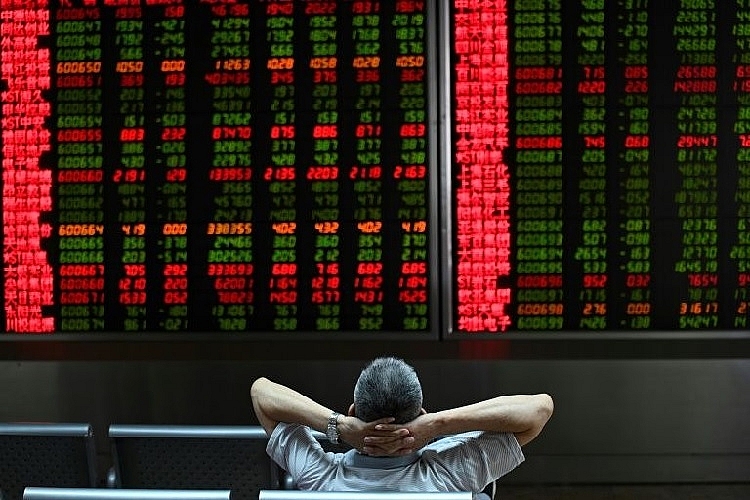Markets brace for extended period of global instability
 |
| Markets brace for extended period of global instability (AFP Photo/WANG Zhao) |
Global equity markets closed out their worst quarter since the financial crisis over a decade ago with an indiscriminate selloff. The longest-ever bull market in US history ended abruptly, with declines so sharp that rarely-used mechanisms to halt trading across the entire market were activated by exchanges on multiple occasions.
Vietnam’s stocks also saw the largest decline measured over the course of a single day since 2002 as investors grow fearful of the economic fallout from the COVID-19 outbreak, coupled with the global oil price war.
Elsewhere, the pan-continental Stoxx Europe 600 suffered its biggest quarterly loss since 2002, while Japan’s Nikkei Stock Average logged the steepest decline since 2008.
Experts are also unsure as to where a V-shaped recovery is, or how long market jitters will last, as uncertainties sparked by the pandemic ebbed and flowed over the past few months. Investors are slowly peering through the fog and trying to see how tough things will become, but essentially they seem to fly blind, economists at Germany’s Commerzbank cautioned.
In Vietnam, foreigners’ confidence fell to a low level, with multiple consecutive selling sessions.
For example, PYN Elite Fund, Thailand-based Finansia Syrup Securities Public, Tundra Vietnam Fund, and Sweden-based Tundra Sustainable Frontier Opportunities Fund continuously reduced their stakes in Saigon General Services Corporation (SVC).
It seems that bears are still the aggressors, with some blue-chips stocks like VIC of Vingroup, HVN of Vietnam Airlines, or MSN of Masan being sold.
A run of poor data from the firms might fuel concerns that the bloc’s anaemic recovery had ended, threatening uncertainties ahead.
“Technically speaking, the downtrend is dominant in the short term as the VN-Index has closed below the moving averages. If the index does not break out a significant resistance at 700 points, the downside risk will be increased. Therefore, traders should stay on the sidelines and wait for the next bullish signal,” noted researchers at KIS Securities.
Global gold futures rose 5.9 per cent, their best one-day performance since 2009, in line with the gold price in Vietnam. The price of the precious metal usually rises in times of uncertainty, but previously, it fell amid a broad selloff in assets as panicky investors dumped stocks, bonds, and commodities in a rush for cash.
However, every cloud has a silver lining. Stocks bounced back after the Vietnamese government reaffirmed continuous operations for transportation, distribution, and financial services, as well as essential services and exports during the “unprecedented nationwide lockdown”.
Last month, local firms ramped up their share buyback plans at roughly over VND3.1 trillion ($134.7 million). Notably, between March 30 and April 1, shareholders repurchased 32.5 million stocks worth nearly VND412.9 billion ($17.9 million), according to fresh data from FiinGroup, a local integrated service provider of financial data and business information.
For example, PAN Group bought 21.6 million of shares; TPBank planned to repurchase up to 10 million shares until April 18; Bui Thanh Nhon, chairman of real estate giant Novaland Investment Group (NVL) completed the purchase of 9.35 million shares, and Tran Vu Minh, son of Tran Dinh Long – chairman of steel giant Hoa Phat Group (HPG) – bought back 20 million HPG shares. Phu Tai JSC also mulls over plans to grasp 1.5 million treasury shares (or 3.2 per cent of the outstanding) via order-matching and/or put-through transactions.
A string of emergency measures by Vietnamese policymakers have helped alleviate some of the most pressing concerns among investors.
As of March 31, 47 out of 79 firms which have just held annual shareholders’ meetings unveiled their rosy outlook of more impressive after-tax profit targets compared to last year.
Particularly, GTNFoods, Kien Long Bank, and Phuoc Hoa Rubber set the goal for after-tax profit increasing from 88 per cent to 1,375 per cent, according to FiinGroup.
Hoa Phat Refrigeration’s products such as air conditioners, freezers, and refrigerators all increased sharply at the end of the first quarter, contributing to the increase in sales of 77 per cent on-year.
Also, VNM of Vinamilk – another blue-chip stock – is slated to be the safe harbour in a choppy equity market thanks to its 75 per cent acquisition in GTNFoods last December, coupled with higher-than-expected demands from Vietnam and other markets such as Cambodia and the Middle East.
Other market observers have cautioned that the stocks rally could likely be temporary. “The market is showing a bit of relief, but I highly recommend investors to err on the side of caution due to unpredictable market movements,” said Nguyen Anh Khoa, head of market analysis and investment advisory at Agribank Securities.
In related news, the State Securities Commission, ratified Official Letter No.2194/UBCK-VP on April 1 in order to classify the equity market as “an essential sector” – a step to promote additional support for the stock market through the COVID-19 crisis.What the stars mean:
★ Poor ★ ★ Promising ★★★ Good ★★★★ Very good ★★★★★ Exceptional
Related Contents
Latest News
More News
- Cashless payments hit 28 times GDP in 2025 (February 04, 2026 | 18:09)
- SSIAM and DBJ launch Japan Vietnam Capital Fund (February 04, 2026 | 15:57)
- Banks target stronger profits, credit growth in 2026 (February 04, 2026 | 15:43)
- Vietnam on path to investment-grade rating (February 03, 2026 | 13:07)
- Consumer finance sector posts sharp profit growth (February 03, 2026 | 13:05)
- Insurance market building the next chapter of protection (February 02, 2026 | 11:16)
- NAB Innovation Centre underscores Vietnam’s appeal for tech investment (January 30, 2026 | 11:16)
- Vietnam strengthens public debt management with World Bank and IMF (January 30, 2026 | 11:00)
- Corporate bond market poised for stronger growth cycle (January 28, 2026 | 17:13)
- Vietnam's IPO market on recovery trajectory (January 28, 2026 | 17:04)

 Tag:
Tag:




















 Mobile Version
Mobile Version